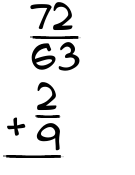What is 72/63 + 2/9?

|
This is how to add
|
|||||||||||
Step 1We have to make sure the denominators are equal. Since 9 is evenly divided by 63, we can multiply just one term to get a common denominator. Multiply 2 by 7, and get 14, then we multiply 9 by 7 and get 63. The problem now has new fractions to add:
|
|||||||||||
Step 2Since our denominators match, we can add the numerators. 72 + 14 = 86 This yields the answer
|
|||||||||||
Step 3The last step is to reduce the fraction if we can. To find out, we try dividing it by 2... No good. So next you try the next prime number, which is 3... No good. So next you try the next prime number, which is 5... No good. So next you try the next prime number, which is 7... No good. So next you try the next prime number, which is 11... No good. So next you try the next prime number, which is 13... No good. So next you try the next prime number, which is 17... No good. So next you try the next prime number, which is 19... No good. So next you try the next prime number, which is 23... No good. So next you try the next prime number, which is 29... No good. So next you try the next prime number, which is 31... No good. So next you try the next prime number, which is 37... No good. So next you try the next prime number, which is 41... No good. So next you try the next prime number, which is 43... No good. So next you try the next prime number, which is 47... No good. So next you try the next prime number, which is 53... No good. So next you try the next prime number, which is 59... No good. So next you try the next prime number, which is 61... No good. So next you try the next prime number, which is 67... No good. 67 is larger than 63. So we're done reducing. And we're done! Here's the final answer to 72/63 + 2/9
|